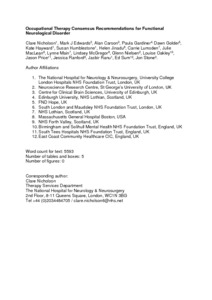Nicholson, C;
Edwards, MJ;
Carson, AJ;
Gardiner, P;
Golder, D;
Hayward, K;
Humblestone, S;
Jinadu, H;
Lumsden, C;
MacLean, J;
et al.
Nicholson, C; Edwards, MJ; Carson, AJ; Gardiner, P; Golder, D; Hayward, K; Humblestone, S; Jinadu, H; Lumsden, C; MacLean, J; Main, L; Macgregor, L; Nielsen, G; Oakley, L; Price, J; Ranford, J; Ranu, J; Sum, E; Stone, J
(2020)
Occupational therapy consensus recommendations for functional neurological disorder.
J Neurol Neurosurg Psychiatry, 91 (10).
pp. 1037-1045.
ISSN 1468-330X
https://doi.org/10.1136/jnnp-2019-322281
SGUL Authors: Edwards, Mark John James Nielsen, Glenn
![[img]](https://openaccess.sgul.ac.uk/112209/6.hassmallThumbnailVersion/OT%20Cons%20Rec%20for%20FND%20Revised%20Manuscript%20CLEAN%20COPY.pdf)  Preview |
|
PDF
Accepted Version
Available under License ["licenses_description_publisher" not defined].
Download (244kB)
| Preview
|
Abstract
BACKGROUND: People with functional neurological disorder (FND) are commonly seen by occupational therapists; however, there are limited descriptions in the literature about the type of interventions that are likely to be helpful. This document aims to address this issue by providing consensus recommendations for occupational therapy assessment and intervention. METHODS: The recommendations were developed in four stages. Stage 1: an invitation was sent to occupational therapists with expertise in FND in different countries to complete two surveys exploring their opinions regarding best practice for assessment and interventions for FND. Stage 2: a face-to-face meeting of multidisciplinary clinical experts in FND discussed and debated the data from stage 1, aiming to achieve consensus on each issue. Stage 3: recommendations based on the meeting were drafted. Stage 4: successive drafts of recommendations were circulated among the multidisciplinary group until consensus was achieved. RESULTS: We recommend that occupational therapy treatment for FND is based on a biopsychosocial aetiological framework. Education, rehabilitation within functional activity and the use of taught self-management strategies are central to occupational therapy intervention for FND. Several aspects of occupational therapy for FND are distinct from therapy for other neurological conditions. Examples to illustrate the recommendations are included within this document. CONCLUSIONS: Occupational therapists have an integral role in the multidisciplinary management of people with FND. This document forms a starting point for research aiming to develop evidence-based occupational therapy interventions for people with FND.
Statistics
Item downloaded times since 25 Aug 2020.
Actions (login required)
 |
Edit Item |



